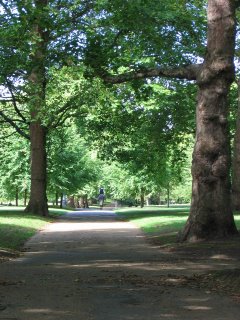Last Chance Londoner, Part III

Closer, closer. Quiet now. Listen.
It is dark and the night is over us. I am hiding here, but not because I want to. London swallowed me, and I am sunk, sinking into her marshy fields, her fetid greens, the old, rubbish-strewn streets. Find me, around this corner, and that one. I am a poor girl, with only this wick to light your way.
It’s Friday morning and I am walking across Green Park, against the grain of the tourists streaming toward the Changing of the Guard.
It is still August, and London, teeming with strangers, is still oddly empty. A guard, in his tall fur hat and red coat, passes me. He’s alone and he seems late. He doesn’t belong here, either. Where is his childhood bedroom? North Yorks? Aberdeenshire? Isle of Man? I wonder. Two women, on their way to Buckingham Palace, laugh out loud at him as he rushes by.
I am in the embrace of Green Park and it is Green, the towering trees bending their leaving branches over the walkways, dappling the light, making the wide space feel like private coves of open air. I watch a Metropolitan Police on a grey mare clop-clop across the tarmac. The day is one blue, glorious, hot and cool, under sun-day, smooshed into a cloud-and-shower-chased August. North Atlantic Summer is tired and ready to go.

We are all meeting around the Tube stop on Piccadilly, around the Ritz. I’ve done it, this week: become a tourist again, in my own town. What have I done to myself? I am discovering the London in me. I am finding out what I know, and what have discovered in myself.
We walk along the Queen’s Walk, then steal into a low and narrow side passage, cut there as if by Potter magic. You’d think only our leader, good ole Hilary and you know this way. But discovering London’s secret alleyways is like loving a discreet and lovely whore. You are the only one, until you pass someone coming in, as you go out.
This is the Old West End and it suddenly makes me feel funny. I am 5 minutes from Piccadilly Circus, from the ugly, 1960s F-R-A-N-C-E building, from the clattering of buses and press of car fumes. Yet here is this tiny, old pantry window, with its single metal bar-—the “child’s thief box”-—and the London I live in has disappeared.
There are no streetlights in the 18th century. There are no sewers. What falls from the horses is left in the street, along with everything else that is tosses there, from the bedpans and dishpans.
Street children are pushed through tiny windows of these wealthy houses. “Link boys” earn money by carrying lanterns for the gentlemen as they walk from one house to another. Inside the rounded window of White’s gentlemen’s club on St. James, Beau Brummel is sitting, dressed to the nines. Under his gorgeous waistcoat, he wears a corset, certainly, smug that he convinced good and smelly King George IV to wash off that make-up. He isn’t an icon: he is a real man, with his cravat in fine, boisterous form.
The windows over the doors of these houses are not décor: they are “lights,” a way to identify a house before houses were numbered, those hundred years before the Post existed. Light the candles and lanterns inside and the fan lights illuminated the streets outside: It was drawn in detail on the invitations for parties, so guests could find the right house.
The men are in the coffee shop (now a wine merchant), dressed or undressed. The shades are drawn discreetly. They are piling themselves on the grand scales, checking their weight, sometimes before and after lunches, such is their vanity. The women never weigh themselves then.
We make our way, in and out of the streets, getting closer and closer to St. James’s Palace and the city home of the Prince and his new wife. I am reminded I am in Modern London. “Fish and Chip Dinner” a board reads outside a centuries-old pub, “Just 6.99!”
Grey dust rains down from the scaffolding, everywhere around us, in this millionaires’ quarter. Above our heads and from behind temporary wooden work-fences Polish workers watch us file past. They aren’t hidden in the dirt and darkness, below the street, as they would have been hundreds years ago. They wear bright yellow vests. We see them and we are reminded how we can visit, but we cannot stay.
Under the Stafford Hotel, under these chi-chi Mews Suites named for beloved horses, are hidden rooms where the richest people secret themselves for private dinners. The Queen, the Thatchers, the old money set dresses up the old cellar to hide from us. Where once only servants and horses dwelled, the best of London call their own.
Hilary rounds us back to the Queen’s Walk in Green Park. Green, it is said, because a King once plucked a flower there while walking with his Queen and presented to his favoured mistress. Hence, the Queen decreed, there would be no more flowers planted.
Closer, closer. Quiet now. Listen.
Poor girl… put the wick out. We have arrived to our destination and you are no longer needed.
The lantern flame extinguishes and she disappears, a smudge on the sky, into the city skyline, another secret.
Old West End
Original London Walks
Fridays, 11 a.m. Green Park Tube (Summer Schedule)







